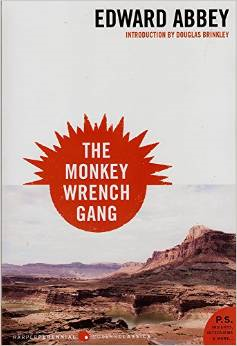Can Fiction Save Our Climate?
 Scientists deal in the non-fiction world most of the time. We want to ask questions, collect data, make tentative interpretations, and then test these theories. It’s the old scientific method that has worked so well for creating our modern world. But sometimes it’s too hard to explain the complex details of science and technology to everyone and debate can devolve into a matter of who do you believe.
Scientists deal in the non-fiction world most of the time. We want to ask questions, collect data, make tentative interpretations, and then test these theories. It’s the old scientific method that has worked so well for creating our modern world. But sometimes it’s too hard to explain the complex details of science and technology to everyone and debate can devolve into a matter of who do you believe.
Can fiction help us in those situations?
Charles Dicken’s prose is lauded for exposing the ugly underbelly of 19th century industrial England. Sinclair Lewis exposed the meat packing industry and the horrid conditions of labor in the United States. George Orwell showed what humans are capable of doing to their fellow humans with their demagoguery. All were and are powerful works of art that exposed our darkest moments.
In looking at the environmental literature, there are landmark non fiction pieces such as Silent Spring, The End of Nature, Collapse, and Earth in Balance. But it’s harder to select nominations for the Great American Novel that deals with climate change. The best known pieces of Cli-Fi ..climate fiction include Flight Behavior, The Water Knife, Odds Against Tomorrow, and Oryx and Crake. But these touch on future dystopian worlds or singular elements of a warming climate.
The most classic novel that reflects the anger many have in response to unrestrained growth is The Monkey Wrench Gang (1975) by Edward Abby. It’s about a small group of people who take into their own hands a campaign to stop the development/destruction of the canyonlands of Utah. As well written and entertaining as it may be, it has been blessed and cursed by it’s impact on decades of budding environmentalists.
Some claim it was the primer to the ecoterrorists of the 1980s and 1990s. Many of you may have forgotten but there were efforts to prevent the logging of old growth forests and the development of pristine habitats in the west. Some of these efforts were violent, most were not. Just before 9/11 President George W. Bush declared The Earth Liberation Front as “The greatest terrorist threat in the country.” Then the towers went down and all our attention was focused on Al Qaeda.
I actually believe that Edward Abby showed most of us how futile violence is in the long run and that his book launched a whole generation of advocates that have done a whole lot more working with the system than trying vigilante efforts to stop it. There have been many places preserved in this country since those dark days back in the 1970s when Abby wrote his treatise. In fact the whole environmental movement has matured and has become part of our culture.
Our trouble today is that our population continues to grow and so does consumption, and our overuse and abuse of fossil fuels. Our everyday activities are warming our oceans and our atmosphere. We need another wake up call that all of us will heed so we can all work together to tackle this climate challenge. I would love to see another piece of fiction stimulate a whole new cadre of people to take action to slow down the warming trend that is destroying the favorable climate that we all grew up in. Stay tuned.
…
Let me hear from you if you have other works of literature that have inspired you to take better care of our Earth.
YES: see TC Boyle's novel A FRIEND OF THE EARTH, published in 2000.
No comments:
Post a Comment